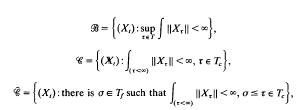Let F be a Banach space, (ω, ℱ, P) a fixed probability space, D a directed set filtering to the right with the order ≤, and (ℱt, D) a stochastic basis of ℱ, i.e. (ℱt, D) is an increasing family of sub-σ-algebras of ℱ:ℱs ⊂ for any s,t ε D and s≤t. Throughout this paper, (Xt) is an F-valued, (ℱt)-adapted sequence, i.e. Xt, is ℱt-measurable, t ε D. We also assume that Xt, ∈ L1, i.e. ∫ ∥Xt∥ <∞. We use I(H) to denote the indicator function of an event H. Let ∞ be a such element: t <∞, t ∈ D,  = D ∪ ∞, and ℱ∞ = σ
= D ∪ ∞, and ℱ∞ = σ . A stopping time is a map τ:Ω→
. A stopping time is a map τ:Ω→  such that (τ<t) ∈ ℱt, t ∈ D. A stopping time τ is called simple (countable) if it takes finitely (countably) many values in D(
such that (τ<t) ∈ ℱt, t ∈ D. A stopping time τ is called simple (countable) if it takes finitely (countably) many values in D( ). Let T and Tc be the sets of simple and countable stopping times respectively and Tf = {τ ∈ Tc: τ<∞ a.s.}. Clearly, (T, <) and (Tf, <) are directed sets filtering to the right. For τ ∈ Tc, let
). Let T and Tc be the sets of simple and countable stopping times respectively and Tf = {τ ∈ Tc: τ<∞ a.s.}. Clearly, (T, <) and (Tf, <) are directed sets filtering to the right. For τ ∈ Tc, let

and

 = {(Xt): there is σ∈ Tf such that ∫(ι<∞) ∥Xι∥ < ∞, σ ≤ τ ∈ Tc},
= {(Xt): there is σ∈ Tf such that ∫(ι<∞) ∥Xι∥ < ∞, σ ≤ τ ∈ Tc},
 = {(Xt):(Xι, ι ∈ T) converges stochastically (i.e. in probability) in the norm topology},
= {(Xt):(Xι, ι ∈ T) converges stochastically (i.e. in probability) in the norm topology},
ℰ = {(Xt):(Xι, ι ∈ T) converges essentially in the norm topology}.